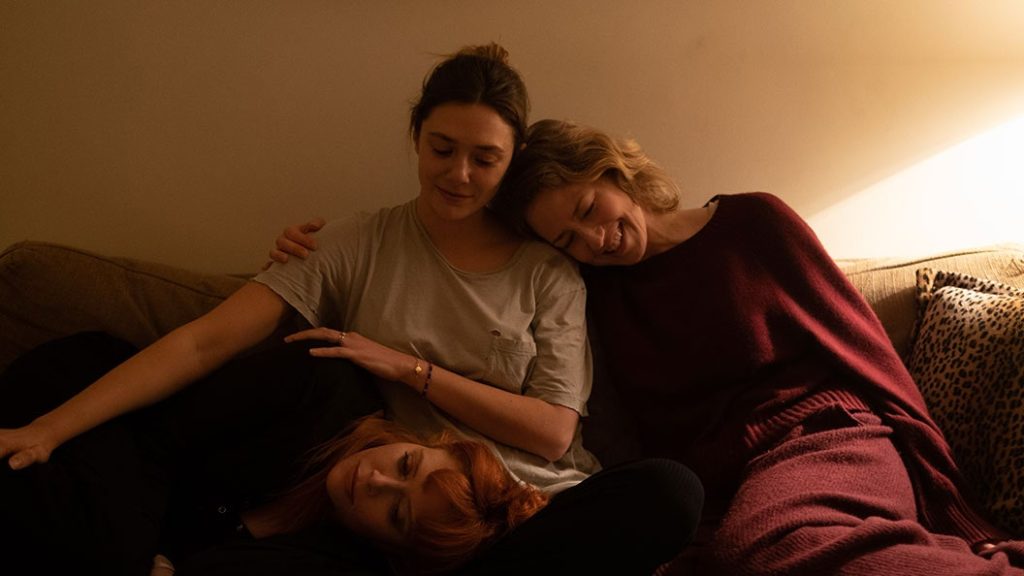His Three Daughters is not a grief drama, exactly. It’s about waiting to grieve, a trio of sisters as trapped in limbo as the father they are preparing to mourn, whose imminent death has reunited them in the compact New York City apartment they once shared. There are people well trained to handle this period of uncertainty; Rudy Galvan plays Angel, a hospice worker who patiently, kindly tells the sisters each day that this could be the day their father passes, but then again, maybe not.
But Katie (Carrie Coon), Christina (Elizabeth Olsen), and Rachel (Natasha Lyonne) are not trained for this. Like so many of us, they revert back to familiar childhood roles once in their father’s presence, even though for most of the film he goes unseen, represented only by a relentlessly beeping heart monitor. Katie is the oldest, bossiest one, fixating on getting her father’s Do Not Resuscitate order signed when she’s not harping on Rachel, who’s still living at home and, in Katie’s eyes, is not pulling her weight. Reformed Deadhead Christina is the lifelong peacemaker, navigating the tension between her sisters with practiced deep breathing and references to her toddler daughter, who has the perfectly irritating name Mirabella.
The film opens with a series of virtually unbroken monologues, the sisters reuniting and immediately presenting themselves to each other— Katie rushed and irritable, Christina smiling and apologetic, Rachel stonily silent until she steps outside for a smoke break. It’s a theatrical flourish from writer-director Azazel Jacobs, and a risky one for a film that could so easily risk feeling stagey. But His Three Daughters finds cinematic power not just in its intimacy— Lyonne’s silent movie star eyes have rarely evoked so much— but with Jacobs’s careful camera, building a fully realized world within these weathered apartment walls.
Like fellow TIFF entry North Star, the family of His Three Daughters was assembled slowly over time; Katie and Christina’s mom died when they were young, and when their father remarried Rachel’s mom she became “like his own”— or simply “his own,” depending on who you ask. The complications between the sisters reveal themselves as the film goes on, sometimes even to the sisters themselves; after one explosive confrontation, Katie looks at Christina with shock, a previously invisible rupture now revealed. The two sisters who left home check in with their real lives now and then, sometimes grappling with who they become with their sisters versus who they consider themselves to be. Rachel does not have that luxury. Her boyfriend (last year’s Babylon breakout Jovan Adepo) steps up to defend her in his own standout monologue, but Rachel largely prefers to retreat, placing sports bets and coping on her own with the reality of having cared for her ailing father before her sisters swooped in.
All the while the sisters are anticipating the moment of their father’s death, both eager and terrified to be released from their purgatory. Their father’s simultaneous presence and absence becomes more dominant as the film unfurls, and when Jay O. Sanders arrives to play him, the deep feelings that usually come with death in the movies finally burst open. It’s maybe a less interesting note to strike than what’s come before— we’re more accustomed to seeing people weeping over memories of their parents, not sitting bored while they slowly expire in the next room. But both emotions are equally real, and Jacobs, who says he is caring for his elderly parents, knows them well.
The three lead performances are the film’s main event, and what will likely help it find distribution following its TIFF premiere. Coon, despite having shown her seemingly infinite range before, remains a marvel as the motor-mouthed Katie, who seems both frustrated by her own capacity for cruelty and unable to stop it. Lyonne tones down her Poker Face bravado to play someone more fragile and quiet, speaking volumes even as she hides in her bedroom. And though Olsen’s character is the most straightforward of the three, her post-Marvel career continues to be a reminder of her ability to hold the screen, to take in the world around her and reflect it back at the audience. You don’t need the presence of an erstwhile superhero to know that movies like His Three Daughters are rare these days, but hopefully it might encourage even more audiences to treasure it.
